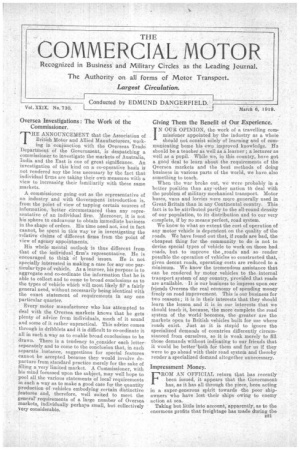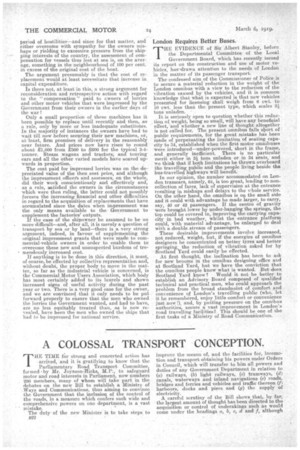Oversea Investigations: The Work of the Commissioner. Oversea Investigations: The Work of the Commissioner.
Page 1

Page 2

If you've noticed an error in this article please click here to report it so we can fix it.
THE ANNOUNCEMENT that the Association of British Motor and Allied Manufacturers, working in conjunction with the Overseas. Trade Department of the Government, is despatching a commissioner to investigate the markets of Australia, India and the East is one of great significance. AD. investigation of this kind on a co-operative basis is not rendered any the less necessary by the fact that individual firms are taking their own measures with a view to increasing their familiarity with these same markets.
A commissioner going out as the representative of an industry and with Government introduction is, from the point of view of tapping certain sources of information, better circumstanced than any representative of an individual firm. Aioreover, it is not his sphere to endeavour to obtain immediate business in the shape of orders. His time need not, and in fact cannot, be spent in this way or in investigating the relative claims of different firms from the point Of view of agency appointments. , His whole mental outlook is thus different frem that of the individual ,firm's representative. He is encouraged to think of broad issues. He is not specially interested in making a case for any one particular type of vehicle. As a learner, his purpose is to aggregate and co-ordinate the information that he is able to collect and to come to broad conclusions as to the types of vehicle which will most likely fill a fairly general need, without necessarily being identical with the exact statement of requirements in any one particular quarter.
Every motor manufacturer who has attempted to deal with the Oversea markets knows that he gets plenty of advice from individuals, much of it sound and some of it rather impractical. This advice comes through in dribblets and it is difficult to co-ordinate it All in such a way as to enable broad conclusions to be drawn. There is a tendency to.consider each letterseparately and to come to the conclusion that, in each separate instance, suggestions for special features cannot be accepted because they would involve departure from standard practice merely for the sake of filling a very limited market. A Commissioner, with his mind focussed upon the subject, may well hope to pool all the various statements of local requirements in such a way as to make a good case fqr the quantity production of vehicles embodying eertain distinctive features and, therefore, well suited to meet the general' requirements of a large number of Oversea markets, individually perhaps small, but collectively . 'Very considerable.
Giving Them the Benefit of Our Experience.
IN OUR OPINION, the work of a travelling cornmissioner appointed by the industry as a whole should not consist sOlely of learning and of communicating home his ,own improved knowledge. He should be a teacher as Well as a learner ; a lecturer as well as a pupil. While we, in this country, have got a good deal to learn about the requirements of the Oversea markets and the best methods of doing business in various parts of the world, we have also something to teach. When the war broke out, we were probably in a better position than any iother nation tb deal with the problem of military mechanical transport. Motor buses, vans and lorries were mere generally used in Great Britain than in any Continental country. This fact is to be attributed partly to the all-round density of our population, to its distribution and to our very complete, if by no means perfect, road system. .
We know-to what an extent the cost of operation of any motor vehicle is dependent on the quality of the roads. We have found out that, if roads are bad, the cheapest thing for the community to do is not to devise special types of vehicle to work on those bad . roads, but to improve the ,roads and so render possible the operation of vehicles so constructed that, given decent roads, operating costs are rednced to a minimum. We know the tremendous assistance that can be rendered by motor vehicles to the internal transport system of any country, provided that roads are available. It is our business to impress upon our Mends Oversea the real economy of spending money freely on road improvement. This is our business for two reasons ; it is in their interests that they should learn the lesson and it isour interests that we should teach it, because,"te more complete the road system of the worldbecomes, the greater are the markets open to British vehicles built for use where roads exist. Just as it is stupid to ignore the specialized demands of eountries differently circumstanced from ourselves, so it is weak merely to fill those demands without indicating to our friends that it would be better'both ler them and for us if they were to go ahead with their road system and thereby render a specialized demand altogether unnecessary.
Impressment Money.
ROM AN OFFICIAL return that has recently been issued, it appears that the Government has, as it has all through the piece, been acting in a super-generous spirit towards -the poor shipowners who have lost their ships owing to enemy action at sea.
Taking but little into account,apparently, as to the enormous profits that freightage has made during the period of hostilities—and since for that matter, and either overcome with sympathy for the owners mishaps or yielding to excessive pressure from the shipping interests of the country, the assessment of compensation for vessels thus lost at sea is, on the average, something in the neighbourhood of 100 per cent. in excess of the original cost of the boat.
The argument presumably is that the cost of replacement would at least necessitate that increase in capital expenditure.
Is there not, at least in this, a strong argument for reconsideration and retrospective action with regard to the " compensation " paid to owners of lorries and other motor vehicles that were impressed by the Government from their owners in the earlier days of the war ?
Only a small proportion of these machines has it been possible to replace until recently and then, as a rule, only by more or less inadequate substitutes, in the majority of instances the owners have had to wait till now before securing their new machines, or, at 'least, firm promises Of delivery in the reasonably near future. And prices now have risen to round about 21,000 from 2500 to 2600 for the typical 3-4tonner. Steam wagons and tractors, and touring cars and all the other varied models have soared upwards in proportion.
The cost paid for impressed lorries was on the depreciated value of the then cost price, and although the impressment officers and assessors, on the whole, did their work conscientiously and effectively and, as a rule, satisfied the owners in the circumstances which were then ruling, the latter could not possibly foresee the increasing financial and other difficulties in regard to the acquisition of replacements that have accumulated since the dates when impressment was the only means available to the Government to supplement the factories' outputs. if the case of the shipowner be assumed to be no more-difficult--and, after all, it is merely a question of transport by sea or by land—there is a very strong argument, indeed, in favour of supplementing the original impressment grants that were made to cornmercial-vehiele owners in order to enable them to overcome these new and unsuspected burdens of tremendously increased cost.
If anything is tobe done in this direction, it must, of course, be effected by collective representation and, without doubt, the proper body to move in the matter, so far as the industrial vehicle is concerned, is the Commercial Motor Users Association, which body has most certainly added to its laurels and shown increased signs of useful activity during the past year or two. There is a very good case for the owner, and we are convinced that. it. only needs. to be put forward properly to ensure that the men who owned the lorries the Government wanted, and had to have, are no less equitably treated than, as is now revealed, have been the men who owned -the ships that had to be impressed for national service.
LondonRequires Better Buses. .
THE EVIDENCE of Sir Albert Stanley, before the Departmental Committee of the Local Government Board, which has recently issued its report on the construction and use of motor vehicles, has-'drawn attention to the needs of London in the matter of its passenger transport, The-confessed aim of the Commissioner of Police is to secure a material reduction in the weight of the London omnibus with a view to the reduction of the vibration caused by the vehicles, and it is common knowledge that what is expected is that new vehicles presented for licensing shall weigh from 6 cwt. to 10 cwt. less than the present type, which scales 3?.;
tons unladen. . .
It is seriously o" pen to question whether this reduction of weight, being so small, will have any beneficial effect, -and whether a new line of thought altogether is not called for. The present-omnibus falls short of " public requirements, for the great mistake has been made of perpetuating the limitation of seating capacity to 34, established when the first motor omnibuses were introduced—under-powered, short in the frame, and generally inefficient. There is no particular merit either in 3itons unladen or in 34 seats, and we think that if both limitations be thrown overboard the travelling public and the people living beside the bus-travelled highways will benefit.
In our opinion, the number accommodated on London tramcars, namely, 64, is too great, leading to noncollection of fares, lack of supervision at the entrance resulting in mishaps and delays to the sehole service. On the other hand, the omnibuS is on the small side and it could with advantage be made larger, to carry, say, 40 or 42 passengers. If the centre of gravity were brought lower by under-hanging the springs, the top could be covered in, improving the carrying capacity in bad weather, whilst the -entrance platform could, with material advantage, be enlarged to deal -with a double. stream of passengers.
These desirable improvements involve increased, not reduced, weight, but, if the energies of omnibus designers be concentrated on better tyres and better springing, the reduction of vibration asked for by Scotland Yard could easily be effected.
At first thought, the inclination has been to ask for new brooms in the omnibus designing office and at Scotland Yard, but we have the conviction that the omnibus people know what is wanted. But does Scotland Yard know? Would it not be better to establish an Advisory Board composed of qualified technical and practical men, who could approach the problem from the broad standpoint of. comfort and convenience of London's travelling public (who, let it be remembered, enjoy little comfort or convenience' just now !), and, by putting pressure on the omnibus authorities, secure a vast improvement in London's roa4 travelling facilities? This should be one of the first tasks of a Ministry of Road Communication.






















